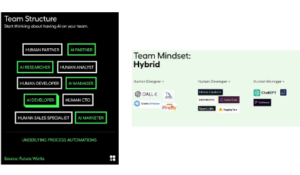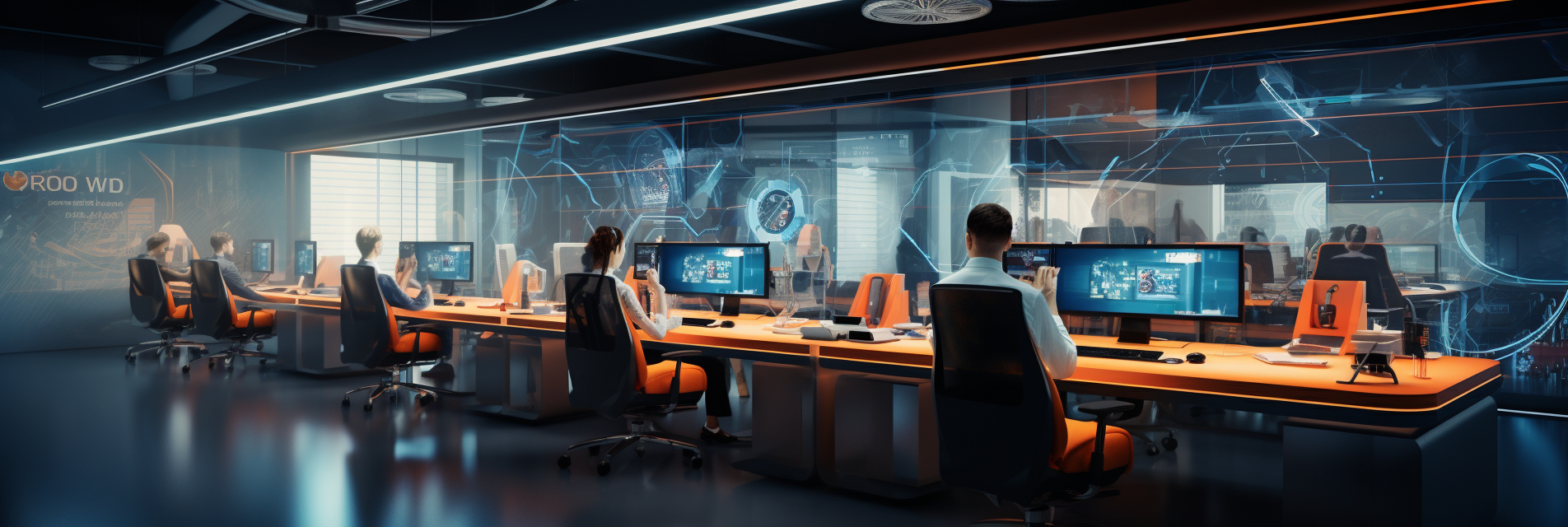
Human Hybrid Teams: How to Train Your Teams to Be Best Buds with AI
Envision a workplace where humans and AI don’t merely coexist—they actively collaborate. This isn’t a futuristic dream, it’s the next big shift in how we work.
AI is no longer the distant echo of a tech promise. AI tools are finding their way into every aspect of the work environment. Ignoring the changing tides risks falling behind.
Let’s bridge the human-AI divide and make tech our favorite teammate.
What’s ahead
- The new ‘hybrid’ teams
- Hybrid Artificial Intelligence: advantages, considerations and examples
- Poll: How comfortable are you with AI as your newest teammate?
- An insider look into how Reliable Group’s marketing team leverages the combination of AI and research for success.
Redefining ‘Hybrid’ teams
Human-AI partnerships are the new ‘hybrid team’. And the remote work era has primed us for AI adoption.
The rise of generative AI tools such as ChatGPT, Bing and DALL-E comes at a time when the world is already grappling with significant shifts in the working landscape. The pandemic-induced shift to remote work catalyzed numerous changes in organizational dynamics and operations. These changes have indirectly prepared many businesses and professionals for the acceptance and integration of AI technologies.
In-person meetings transformed into Zoom or Teams calls, making the transition to collaborating with AI models or using AI to facilitate virtual collaboration, a smaller leap.
Remote work relies heavily on data-driven decision-making. AI tools facilitate handling large datasets, fitting naturally into this framework.
With the remote work model, many companies have started to reconsider the nature of specific roles and how they can be transformed or augmented with technology, setting the stage for AI-enhanced roles.
Advantages of human-AI hybrid teams
Many teams are scared that AI will replace human talent. But the reality is that human-centered AI has the most benefits. Humans alone or AI alone are no match for the human-AI hybrid team.
Here are five advantages of adopting a hybrid human-AI team model:
- Enhanced Productivity & Efficiency: By offloading repetitive and routine tasks to AI, you free up humans for strategic thinking.
- Informed Decision-making: AI uncovers insights from big data which humans can interpret and analyze. When accurate information is entered and reviewed, errors are reduced. Humans + AI = informed, error-free choices.
- Continuous Learning & Upskilling for Successful Integration:
Upskilling your team to work alongside AI allows them to stay updated with tech advancements and tackle new challenges more effectively.
- Scalability & Flexibility: AI systems can easily scale operations based on demand, making it easier for businesses to adapt to changing needs without significant overheads. This dynamic adaptability ensures teams can handle diverse tasks efficiently.
- Innovation & Creativity Boost: With AI handling data-driven tasks, humans are free to get to the creative aspects. Groundbreaking innovations are possible when technology amplifies human potential.
Incorporating AI into team dynamics reshapes how teams think, operate, and innovate.
Considerations for hybrid human-AI teams
Matt Cyrankiewicz from Future Works built a million-dollar pipeline in 30 days with a $0 budget by treating AI as a partner for his team. But it didn’t come without its challenges.
He found trust within the internal team to be a major obstacle. Employees were resisting the integration due to concerns about job displacement, or a simple reluctance to adapt to new technologies.
To show that AI wasn’t a threat, Matt implemented a system where teams were asked to do tasks which were ‘impossible’, with no consequences for failure. This fostered engagement with AI and resulted in increased creativity and productivity. Team members were able to work without fearing repercussions. Matt reinforced the idea that being able to work with AI makes you indispensable.
As Matt said during his Ignite AI Coffee Hour interview, by introducing a penalty-free space for experimentation, team members shift from “AI sucks, I’ve already tried it” to “holy shit! I am god.”
Upskilling Your Team with AI
While AI can automate many tasks, it requires human teams to possess a new set of skills to collaborate effectively. Upskilling employees to understand and work alongside AI doesn’t have to be hard. Fostering a culture of education helps everyone get ahead.
Here are our favourite course options (many are free!):
- DeepLearning.AI: AI for Everyone (beginner)
- Digital Partner: The Fundamentals of ChatGPT: AI Language Model (beginner)
- IBM: AI for Everyone: Master the Basics (beginner)
- University of Helsinki: Ethics of AI and Elements of AI: Introduction to AI (beginner)
- Learnprompting.org: Learn Prompting (beginner & intermediate)
- Artificial Intelligence for Business and ChatGPT (intermediate)
- Université de Montréal: Deep Learning Essentials (intermediate)
- DeepLearning.AI: Generative AI with LLMs (intermediate)
- University of Helsinki: Building AI (intermediate-advanced)
- IBM: Applied AI with DeepLearning (advanced)
Integrating AI into Processes

Integrating AI into existing systems and processes is more involved than just adding AI tools. What helps is thinking about them as actual team members.
Here’s an example from Future Works of how to start thinking about integrating AI into team structures and the applications that can aid productivity in different roles:
Growing the capabilities of your team to collaborate with and train AI creates a structure where humans are able to take on managerial positions. Their AI counterparts will then function as ‘executors’ or ‘junior members’ responsible for basic tasks. Effective pairing results in growth and fosters a culture of leadership and responsibility.
Investment in AI and training
Global investment in AI and training is skyrocketing with companies increasingly integrating AI into their processes. Many of the big names you know will soon have human-AI hybrid teams.
- In September 2023, EY announced a $1.4 billion investment into AI and unveiled their proprietary LLM, EY.ai EYQ. The firm plans to train its 400,000-strong workforce in AI, indicating a strong future commitment.
- KPMG has earmarked $2 billion for AI and cloud services over the next five years and PricewaterhouseCoopers is allocating $1 billion to generative AI in the U.S. within three years.
- In 2017, Accenture estimated that businesses that successfully apply artificial intelligence in conjunction with human collaboration will increase their profitability by an average of 38% by 2035. In 2023, Accenture revealed a $3 billion investment to bolster its data and AI practice.
- In 2021 Deloitte proposed that AI can transform customer experiences when paired with human ingenuity. For instance, in marketing, AI algorithms can segment audiences at a granular level, while humans can craft targeted messages. In 2022, Deloitte set aside $1.4 billion for tech training, including AI.
Industries integrating AI
AI is transforming industries across the globe. The common theme is the augmentation of human capabilities through AI, leading to increased efficiency, better decision-making, and improved customer experiences.
Here are some examples of how AI and humans are collaborating across various industries:
- Healthcare: The healthcare sector is increasingly integrating AI into patient care with hospitals investigating the use of AI instruments to tailor care more individually for its patients. UPMC has revealed that they are using AI solutions from Abridge to capture and transcribe conversations between patients and doctors.
- Finance: Companies in the financial sector are using AI for trading and risk assessment. In 2023, JPMorgan advertised over 3 600 AI-related jobs, embracing AI in the industry.
- Customer Service: Many companies employ chatbots and virtual assistants to handle routine customer inquiries, freeing up human customer service agents to focus on more complex and empathetic interactions. Amazon’s Alexa is a popular example.
- Retail: Companies like Walmart are using AI for inventory management and demand forecasting. This ensures that products are in stock when customers need them, optimizing supply chains and improving customer satisfaction.
- Marketing: Digital marketing platforms like HubSpot use AI to assist marketing teams in targeting the right audiences with personalized content.
How Reliable Group combines research + AI for success
Our marketing team believes that treating AI as a team member saves time and allows our human counterparts to play to their creative and strategic strengths.
By training AI to work within our existing processes, we’re cutting down on the redundancy of repetitive tasks, speeding up the research process, and enabling a space for collaborative ideation for content.
Not only do we foresee a positive future, we’re already seeing the results as we continue to foster hybrid artificial intelligence internally.
Here’s how our marketing team is adopting AI technologies into their workflow:
- Using HARPA for research
- Using ChatGPT to generate ideas, structure posts and condense information
- Using Gamma.ai to create quick skeletons of slide decks
- Using Read.ai for summaries
Using AI in conjunction with human-led research works. Here’s a prime example of how we’re using AI to boost research and content creation efforts:
Our CEO, Veeral Lakhani, is presenting at the upcoming TribeOpen event. Our initial attempt at crafting a presentation took 2.5 hours and was just a skeleton. Veeral found it uninspiring.
The team regrouped, this time syncing with Veeral and employing AI tools for assistance. Using Read.ai for note-taking, ChatGPT for outlining, and Gamma.ai for presentation creation, we crafted a robust presentation in just 1 hour 10 minutes, giving Veeral tangible slides to directly provide feedback on.
The outcome? An engaging presentation that our CEO approved, created in half the time.
Lessons learned:
- Ask the right questions to the right people up front. We feel that AI doesn’t have the discernment yet and human partners are essential here.
- String AI tools together for a stronger end result. Instead of asking “What’s the best tool?”, figure out the unique capabilities of each tool and employ them accordingly.
- Generative AI helps give stakeholders something tangible to react to. In our example, our CEO didn’t like every single slide but having slides be that far along made it easier to envision the overall impact of the presentation. AI makes it less time-consuming to make multiple versions and lets you give stakeholders something tangible to react to.
Main takeaway
Ultimately, it’s all about collaboration and trust.
AI is now a colleague that can contribute to meetings and projects. Making sure your team feels safe within their roles is paramount to success.
In order to trust, they need to know what’s what. This is why investing in AI training and upskilling matters. When it comes to AI-human hybrid teams, upskilling isn’t just beneficial—it’s essential. By investing in employee training and having refined content and strategy processes, you can shift hesitant mindsets and foster a collaborative environment where both humans and AI thrive.
Organizations across the globe are adopting hybrid artificial intelligence, including our own.
Among the advantages, efficiency tops the list. Hybrid teams eliminate redundancies by ensuring that tasks are allocated based on strengths. Repetitive and data-intensive tasks are relegated to AI, ensuring precision and speed, while tasks demanding emotional intelligence, creativity, and moral judgment are best suited for humans.
As AI pulls up a chair in our daily huddles, let’s ensure our teams are ready to embrace this revolution.
Are you ready to make AI your team’s best bud but lacking the talent and know-how? With over 50 years in business, our remote teams are readily equipped to guide you in seamless AI integration. Connect with us today.
Liked this blog? Sign up for our exclusive AI monthly newsletter.
Previous articles

AI 2024: Predictions and Advances in Artificial Intelligence
There’s no doubt 2023 was a landmark year for AI technologies. From healthcare to customer service and beyond, AI transformed the way the average person communicates, works, and solves complex problems. In this article, we’ll delve into the advances and breakthroughs achieved in AI development, as well as the opportunities and challenges that lie ahead […]

AI Call Centers: Turning Customer Support into Customer Experience
When a customer contacts an AI-enabled call center, two things can happen: The customer leaves satisfied with the interaction Their issue is not resolved and they leave with a negative association of your brand Keeping customers satisfied relies on the appropriate use of AI in call centers. This often means centering AI automation as a […]